At the back, Indrani whispered to Accused No 2 Sanjeev Khanna: 'This is really important.'
Vaihayasi Pande Daniel reports from the Sheena Bora murder trial.
Illustration: Dominic Xavier/Rediff.com
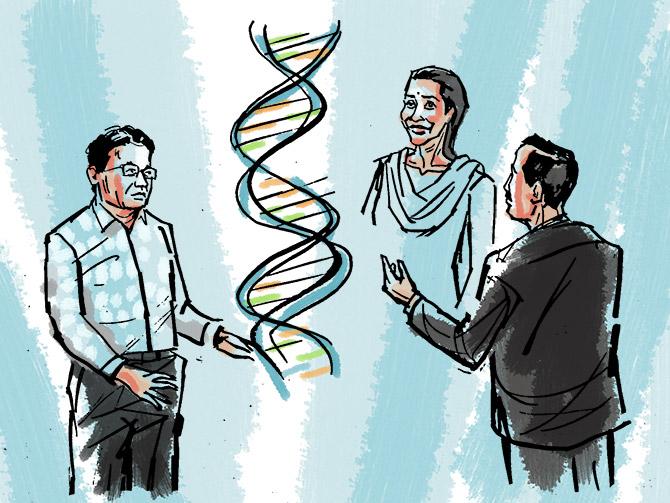
A week away from Mumbai, and its courts, spent in Ranchi, saw the Hyderabad encounter killings and Indrani Mukerjea come up as topics of conversation with a group of educated city citizens there.
What Indrani doesn't know -- or maybe she is all too aware -- is that even if she is handed down a sentence of not guilty by the judge at the end of this long and meandering trial, for India's legion of armchair judges, who take their 'quasi-judiciary' powers awfully seriously, she will always be guilty.
She won't be able to change that. Ever.
Indrani, who is something of a household name across the country, specifically carries a much larger burden of being firmly judged, years before the verdict is in, simply because she is a woman -- a good-looking, wealthy and sharp woman at that.
The Indrani Mukerjea -- who on Tuesday, December 10, 2019, walked into Courtroom 51 for the Sheena Bora murder trial at the Bombay city civil and sessions court and who actually leads a sheltered if dreadfully uncomfortable existence in Byculla jail, central Mumbai, far away from the fierce public opprobrium -- was a hopeful one.
Looking fresh and summery in a striped pastel, sleeveless kurta, a white chunni and churidar, bindi, her spirits always buoyant, she, Accused No 1, was anxious for a positive ruling on her fourth bail plea, that might be delivered at the end of the Tuesday hearing.
The cross-examination by the defence of Prosecution Witness No 59 and Directorate of Forensic Science Laboratories, Kalina, north west Mumbai, forensic expert Shrikant Hanumant Lade, 54, began on Tuesday after an adjournment of ten days, that the defence sought, to obtain expert advice.
Lade's testimony had been recorded already on November 19 where he had connected the DNA found on the semi-burnt corpse at Raigad district to Indrani's.
Dressed in a white checked shirt, black trousers, grey sports shoes and black glasses, Lade took the stand along with a plastic bag of papers.
The dapper Sudeep Ratnamberdutt Pasbola, who sauntered into CBI Courtroom 51, hands folded behind his back in inimitable Pasbola style, close on Indrani's hopeful heels, armed with a copy of DNA for the Defence Bar by DNA Initiative, might have been wearing a lawyer's black coat, a bright white shirt and lawyer tie, black trousers and three pens, two gold, one red.
But December 10 he was Notable DNA Expert For The Day, whose intimate knowledge of the double helix was considerably more vast and sophisticated than Watson and Crick.
Defence lawyers, whose main job is to shovel smoke, as a famous legal specialist once said, are constantly reinventing themselves each time they enter a courtroom. Each day brings a new role. A new character.
Some days they are experts on random, vague disciplines that could range from banking, country pistols, luxury automobiles to rigor mortis and petit mal. Other mornings they arrive in court having become doctors, professors, architects, undertakers or scientists overnight (aided by swotting done burning the midnight oil).
Actors, of course, they all are too. Always.
Faithfully consulting his manual on DNA, Pasbola spent a better part of an hour, towards the end of the hearing, quizzing Lade, The Actual DNA Expert, on the nature, structure and peculiarities of DNA, like he was conducting Lad's viva voce.
Pasbola stated that all human DNA was 99.9% alike. And it was the crucial and miniscule .01% DNA sequence difference ensured the unique differences between each human being.
Lade corrected him: "99.7%".
They quibbled.
Pasbola, who obviously considered himself the superior or only DNA expert in the room, insisted on 99.9%.
Most science journals online back Pasbola's number.
But before that, right up to the lunch break, Pasbola, Indrani's lawyer, focussed most of his efforts on showing up Lade to be not a DNA expert.
It began with his educational qualifications, earned from Shivaji University, Kolhapur in 1988, and the fact that Lade, who hails from Karad in Satara district, had specialised in chemistry rather than biology at his MSc level and his study of molecular biology had been limited.
Lade kept insisting his science study had included molecular biology right from high school.
Pasbola, on the verge of becoming a molecular biologist too, rudely dismissed his contention: "None of your subjects were molecular biology. I know about 12th (class). It was taught to us too! Nascent stage."
The exchange was such that it felt as if Pasbola was the head of the Forensic Science Laboratory, and he was interviewing potential candidate Lade for a job there, so narrow and intimidating was his questioning.
He then ripped to shreds Lade's DNA fingerprinting training which, as he zealously delved about and made calculations, amounted to 15 days at the Centre for DNA Fingerprinting and Diagnostics, Hyderabad, plus another four-day workshop after that in Delhi. And Lade could not remember the exact names of his instructors.
Next he enquired about Lade's case loads and the extent of Lade's research and published work. That turned out to be exactly one paper, published in the Indian Police Journal and Lade was not able to even recall when exactly it had been published, much to Pasbola's enacted suspicion and astonishment.
Had Lade ever been suspended? Had he been charged?
Indrani stood up in the accused box at the rear of the room to make sure she followed this part of the exchange word for word, her eyes gleaming with excitement.
Pasbola: "Did it happen that you were prosecuted because you did not give an opinion in favour of a law enforcement agency? Mr Lade, were you ever suspended? And still under suspension? Yes, suspended on allegations have given a wrong report. The charge is that. The charge may be false as all charges are," he added thoughtfully.
Lade admitted quietly that he had been suspended in October 2019. But not for differences with an investigative agency.
Pasbola probed on and said he was aware of two cases Lade had been investigated for wrong doing -- one in Pune and one in Kalyan.
Lade acknowledged the Kalyan incident: "Wrong labelling by my receiving assistant. My analysis was right. Only the labelling was wrong."
Pasbola silkily: "Mr Lade, would that be in the case of the skull of Sanam Hassan (Pune). You gave the analysis that it was the skull of a male?"
Lade countered: "The skull was not received in that case. But the heart sample was received and it was analysed. After we did the DNA profile we reported that the DNA profile was that of a male. Not correct to say that in the Sanam case (in 2012) I was charged."
According to news reports from that period, available on the Internet, allegations had been levelled that the tests, in the Sanam Hassan case, had been intentionally 'botched' and samples had been deliberately swapped, and that report had been signed by Lade.
Once Pasbola had established melodramatically before the court, for the court to decide, Lade's allegedly questionable professional qualifications, the lawyer moved on to being India's Number One Quality Assurance Officer and queried the DNA expert about the protocols for both collecting and preserving DNA.
That dissection went on for a good half an hour, till Lade made a crucial statement.
But proceedings were rudely interrupted briefly and comically when a television journalist, who was watching a news programme, in court, on his cellphone, forgot to kill the volume. The court and the judge froze when a dialogue about Majha mukhya mantri suddenly erupted from the back of the room. His phone was temporarily confiscated.
Lade's key assertion was: "In every case if the sampling (collection of sample) is not properly done we can't get a DNA profile."
Pasbola: "And if the protocol for preservation is not followed the sample which is collected gets degraded or becomes useless?"
Lade: "Yes."
But if Lade was a lack-lustre, mildly boring witness and a verbal pressure cooker to boot, whose words spewed out in unintelligible bursts, on Day 1 of his cross-examination he didn't fare too badly. He more or less stood his ground before Pasbola's ceaseless attack and did not get confused or speechless, even if he did quickly switch over to Marathi when the heat was on.
Before the hearing ended, with the Grand Tuesday DNA Structure Quiz between Team Pasbola and Team Lade, the lawyer spent some time enquiring how DNA investigation cases are numbered and examining the outward register of the DNA department at the Forensic Science Laboratory.
At the back, Indrani whispered to Accused No 2 Sanjeev Khanna: "This is really important."
As Lade wrestled bravely with the bulky, desk-sized register and Pasbola perused his xerox copy of them, it was confirmed that the register showed four entries for reports issued of DNA analysis.
However the defence had just three of the reports.
The fourth report pertaining to the soil sample from the crime scene was not in the defence's possession.
Already in his earlier testimony Lade had said the soil sample had not produced any identifiable DNA, which, on the contrary, it might be expected to, considering that it was in close proximity of a corpse that would have exuded body fluids rich in DNA.
Pasbola also significantly asked, in a forbidding voice: "Were you questioned by anyone regarding the reports which you had submitted in this case regarding DNA analysis? Anybody under the sun?"
Lade took a moment to consider the question and then said: "I just gave my reports to the director."
CBI Special Judge Jayendra Chandrasen Jagdale grinned, looking at the severe-faced Pasbola: "By nobody except you!"
Lad's cross-examination will continue Wednesday, December 11.
The DNA expert has been asked to bring his log books and FSL protocol manual, that guided Lade's work.
At the close of the hearing, much dialogue was exchanged over CBI Deputy Superintendent of Police S Parthasarathy's (of former finance minister P Chidamabaram arrest photos fame) request to have Peter Mukerjea taken to Delhi for further questioning in the INX Media case.
Peter was reluctant to go to Delhi. He preferred questioning by video-conferencing right from the Arthur Road jail and said his health would not permit him to face the Delhi cold.
Judge Jagdale refused, retorting with a smile: "Then if a case will be filed in Siberia can you say conditions are not suitable for you to attend?!"
There was then a back and forth on how Peter would travel to Delhi. He wanted to do it by train like last time when he travelled by the Rajdhani. Parthasarathy, who we already know from the night of Chidamabarm's arrest utilises various types of locomotion, including wall-vaulting, was entitled to travel by air.
The judge slightly exasperated with the excessive discussion on the modalities of travel finally declared: "If both of you want to travel by train, then go!"
It was close onto 4.30. The judge summoned Parthasarathy to his chambers for a chat.
Lade, his classic Maharashtrian sangfroid and pride still sturdily intact, picked up his plastic bags, climbed down from the witness stand to sit with the prosecution team for a spell.
The bail plea ruling was put off till the end of the cross-examination.
The accused trudged back to their respective prisons.
Peter is still housed in the prison hospital and is not back in the jail's top quarters, Barrack 12, in spite of having made an application for a transfer that the judge said he did not have the powers to grant. He has a bed and a chair.
But no table yet.
Or the privacy and safety Barrack 12 afforded, where possibly absconding jeweller Nirav Modi already has a long-stay reservation confirmed, continental breakfast not included.
Vaihayasi Pande Daniel covers the Sheena Bora Murder Trial for Rediff.com.
You can read her fascinating coverage here.
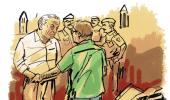
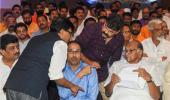


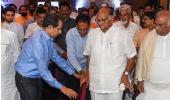



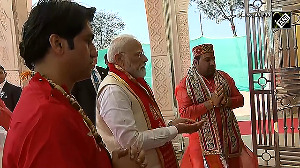


 © 2025
© 2025